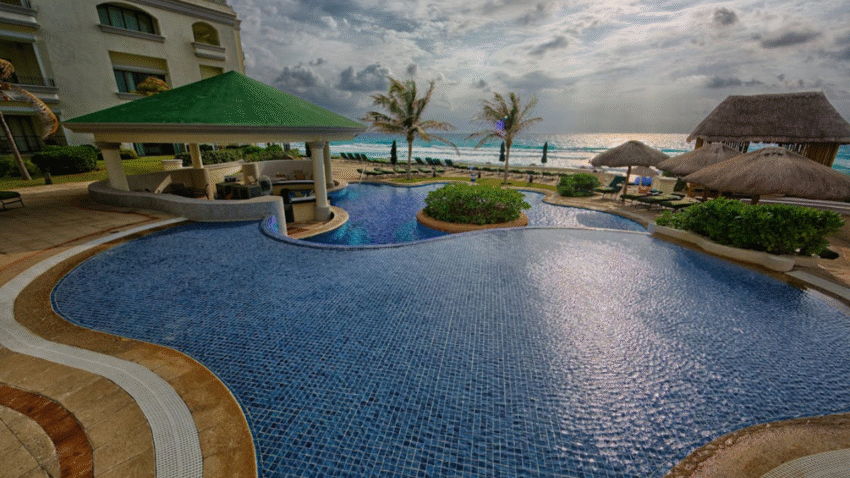Introduction
Looking to upgrade your poolside area from plain to paradise? Great landscaping turns an ordinary backyard pool into a relaxing retreat. In this guide, you’ll learn how to landscape around your pool with smart, stylish, and safe options. Whether you’re starting fresh or enhancing an existing setup, this step-by-step guide will help you plan a beautiful and low-maintenance poolside landscape.
Why Pool Landscaping Matters
A well-designed landscape does more than look great—it plays a crucial role in your pool’s comfort, cleanliness, and safety. The right layout:
- Reduces debris in the water
- Creates shade and privacy
- Prevents soil erosion
- Keeps surfaces cool and safe
- Adds value and visual appeal
With careful plant choices and layout planning, you’ll create a poolside oasis that’s both functional and inviting.
Step-by-Step Guide to Landscaping Around Your Pool
Step 1: Plan Your Layout and Zones
Start by sketching a basic layout of your pool area. Identify how you want to use the surrounding space:
- Lounging zone (sunbeds or hammocks)
- Dining zone (tables or outdoor kitchen)
- Pathways for access
- Privacy buffer or screen areas
- Planting beds for visual interest
Tip: Keep at least 3 feet of clear space around the pool perimeter for safe walking and maintenance.
Step 2: Choose Pool-Friendly Plants
Not all plants are suitable near the pool. Pick varieties that are:
- Low-maintenance
- Non-shedding
- Drought-tolerant
- Resistant to chlorine or salt
Best Poolside Plants:
- Ornamental grasses (e.g., Blue Fescue, Fountain Grass)
- Tropical palms (e.g., Queen Palm, Sago Palm)
- Succulents (e.g., Agave, Aloe Vera)
- Shrubs (e.g., Boxwood, Viburnum)
- Groundcovers (e.g., Liriope, Asiatic Jasmine)
Plants to Avoid:
- Shedding trees (e.g., Oak, Pine)
- Messy flowers or berries (e.g., Bougainvillea, Mulberry)
- Thorny bushes near walkways
- Bee-attracting plants like lavender near lounges
Pro tip: Use native or climate-adapted plants for best results with minimal upkeep.
Step 3: Use Hardscaping for Structure
Hardscaping refers to the non-plant elements in your landscaping, like:
- Pavers, stepping stones, and pathways
- Retaining walls or raised beds
- Planters, edging, and borders
- Built-in benches or shade structures
Choose materials that are:
- Slip-resistant
- Cool underfoot (e.g., travertine, stamped concrete)
- Water- and weather-resistant
Caution: Avoid gravel or loose mulch right next to the pool—they tend to wash or blow into the water.
Step 4: Create Shade and Privacy
Add comfort and seclusion to your pool area with:
- Tall plants or hedges (e.g., Bamboo, Podocarpus)
- Pergolas or shade sails
- Trellises with climbing vines (e.g., Jasmine, Trumpet Vine)
- Outdoor curtains or privacy screens
These elements provide relief from the sun, block wind, and make your pool feel like a private resort.
Step 5: Install Smart Irrigation and Drainage
Watering and drainage are key around a pool. Improper systems can lead to flooding, slippery surfaces, or dead plants.
- Install drip irrigation to conserve water and prevent overspray into the pool
- Grade the soil to slope away from the pool
- Use French drains or gravel trenches to manage runoff
Tip: Keep sprinklers and irrigation heads pointed away from the pool to prevent chemical dilution and algae growth.
Step 6: Light the Landscape
Add outdoor lighting for safety and ambiance:
- Pathway lights for walkways
- Uplights for trees and palms
- LED strips under coping or in planter beds
- Solar lights for low-energy maintenance
Bonus tip: Motion-sensor lights near entrances increase safety and security.
Step 7: Add Personal Touches
Finish your landscape with elements that match your style and lifestyle:
- Colorful pots or planters
- Water features (like a small fountain or waterfall)
- Outdoor speakers or lanterns
- Fire pit or fireplace for cooler evenings
- Poolside sculpture or garden art
Keep everything pool-safe, weatherproof, and cohesive with your home’s design.
Common Mistakes to Avoid
1. Overplanting Too Close to the Pool
This causes root damage and extra debris in the water.
Solution: Keep at least 3–5 feet of buffer between the pool and large plants or shrubs.
2. Using Mulch or Gravel Near Pool Edges
Loose materials blow or wash into the water, causing filter clogs.
Solution: Use stone pavers, concrete borders, or artificial turf near the edge.
3. Ignoring Drainage Slopes
Improper grading can lead to standing water and erosion.
Solution: Make sure soil slopes away from the pool deck and install drains if needed.
4. Planting Trees with Invasive Roots
Roots can crack concrete and plumbing.
Solution: Choose trees with small or non-invasive root systems.
5. Using Plants That Attract Insects or Bees
Bees and wasps don’t mix well with swimmers.
Solution: Avoid fragrant flowering plants near the pool and lounges.
Extra Tips & Pool Hacks
- Use landscape fabric under beds to reduce weed growth
- Install fake turf or rubber mulch in play zones to keep things clean and soft
- Use decorative rock beds for low-maintenance contrast
- Group plants in odd numbers (3, 5, or 7) for a more natural, pleasing design
- Add misting systems or fans under pergolas for extra cooling
Want to take it further? Check out our article on [How to Build a Shaded Area Near Your Pool] for ideas on pergolas, sails, and more.
Conclusion
With the right plan, landscaping around your pool can be both practical and beautiful. From safe paths and smart plant choices to stylish seating and lighting, every element enhances the experience. Whether you go for a tropical retreat, modern elegance, or a kid-friendly space, thoughtful landscaping will make your pool the centerpiece of your backyard.
Final tip: Start small, build in stages, and keep maintenance in mind. A well-designed poolside landscape grows more enjoyable—and valuable—with every season.
